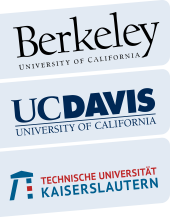

IRTG 2057
Physical Modeling for Virtual Manufacturing Systems and Processes
 The German Research Foundation (DFG) had funded the International Research Training Group (IRTG) over the maximum period of nine years from July 2014 until July 2023. The Subject was “Physical Modeling for Virtual Manufacturing Systems and Processes”. The partner University of Kaiserslautern was the University of California, with locations in Berkeley and Davis. This program was Germany's first international graduate program in the field of production engineering.
The German Research Foundation (DFG) had funded the International Research Training Group (IRTG) over the maximum period of nine years from July 2014 until July 2023. The Subject was “Physical Modeling for Virtual Manufacturing Systems and Processes”. The partner University of Kaiserslautern was the University of California, with locations in Berkeley and Davis. This program was Germany's first international graduate program in the field of production engineering.
The aim of the research was to provide the planning of production on a new basis. Production was already planned from a single machine to a complete factory with the help of computer models. What these models were lacking, was a description of the actual physical properties. Based on such models, it is possible to calculate key properties of a production line as the quality of the products or the energy consumption of a factory in advance and to perform targeted improvements. In particular, the physical interactions of the three levels: factory, machine and process were considered.
The topic was content-driven mainly by two disciplines: engineering and computer science. Through the application of scientific knowledge and advanced computer-based methods in conjunction with physical models on a level unrealized in the past, technologies and methods were promoted, which can be used for planning and optimization manufacturing systems and processes. As a result, fundamental understanding as well as extensive systems, tools and computational algorithms which significantly improve the integration of advanced computational methods for solving problems of manufacturing systems and processes are now available.
In addition to the excellent research program, the International Research Training Group was characterized by a unique training and support concept for the students involved. This not only enabled our students to finish their PhD in their respective field of research within three years, but also gave them the opportunity of the training of key qualifications, as well as the seamless exchange of scientific knowledge and staff at all levels and in all disciplines. Thus, the lectures were specially designed for the individual research areas for doctoral candidates, in which background information and current methods was taught for the IRTG.

